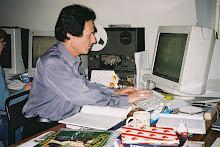Hello All:
Not sure if anyone caught the front-page article in The Toronto Star today (January 15, 2009): Even 'smart TV' harms baby brains, doctor says'.
"In one of the most extensive reviews of its kind, the Seattle pediatrician (Dr. Dimitri Christakis) says infant-aimed DVDs such as Baby Einstein, and even award-winning kids' shows like Sesame Street, can do more harm than good to children under the age of 2."
"In fact, the sensory overload of all those colours, sounds and sights - be it Big Bird or Baby Mozart - may be partly to blame for the tenfold incrase in cases of attention-deficit/hyperactivity disorder (ADHD) in the past 20 years. It now affects between 5 and 20 per cent of American children."
"In his survey, published in 2007, he found 29 per cent of families let infants watch TV because 'it's good for their brain,' while 24 per cent use it as a 'babysitter'".
"...he's calling for tough regulation. France, for instance, recently moved to curtail the broadcasting of shows aimed at children under 3, which has affected 24-hour channels such as Baby TV."
"Studies have shown (...) that baby programs can actually delay language development (infants learn better from 'live presentations') and harm attention spans."
"The truth is that we're in the midst of a large, uncontrolled experiment on the next generation of children. We're not going to know for years what the effects of all this exposure to TV will mean, in a scientific sense. But I'm concerned that we're not going to be pleased with the results."
Interestingly, (Christakis) "...even accepts some of the blame. He believes scientists such as him have helped create the trend: ...we've created a neurosis around optimizing them (children) and that's spawned industries that essentially now prey on people's obsession and fear."
This idea or observation ("upgrading" children) is also the focus of an entire book, Under Pressure: How The Epidemic of Hyper-parenting is endangering childhood, by Canadian Carl Honore, currently living in London England with his family.
His is a great book - do yourself a favour and read it, even if you might not agree with it all. In his blog, http://carlhonore.comb/ (great "stuff"), he echoes what Wesch said in his presentation:
"Today’s students are very good at finding and manipulating information, and at analyzing visual data, but other skills seem to have fallen by the wayside. University professors complain that students now balk at reading whole books, preferring much shorter excerpts and articles. They also seem impatient with ambiguity, demanding instant answers that are black and white. The reasons for this are complex, but the obsession with test scores plays a role."
Take a look at this URL (Dr. Dimitri Christakis: Harnessing Technology for the Benefit of Children and Their Families): http://research.seattlechildrens.org/about/feat_research/harnessing_technology_for_the_benefit_of_children.aspand especially (University of Washington School of Public Health):
http://sphcm.washington.edu/faculty/fac_bio.asp?url_ID=Christakis_Dimitri
The first study I read on this topic was by Marie Winn in her book The Plug-in-Drug (another great "read"), written about 25 years ago. This URL http://mariewinn.com/plugin.htm will take you to her site:
"The fact that the verbal scores went down far more than the math scores lends support to the theory that TV was a causal factor. As Chapter 7 argues, extensive television viewing affects young children’s verbal development more than the development of their visual or spatial abilities. And as the previous section indicates, numerous studies have shown a strong negative association between television viewing and school performance. Reading achievement seems especially vulnerable to the effects of excessive television viewing and reading, it is universally acknowledged, is the key to academic success."
Books I can suggest on the topic (computers, television and the brain) include:
(1) Armstrong, Alison. The Child and the Machine: Why Computers May Put Our Children's Education at Risk. 1998.
(2) Bauerlein, Mark. The Dumbest Generation. 2008.
(3) Flesch, Rudolph. Why Johnny Can't Read. 1955.
(4) Honore, Carl. Under Pressure: How the Epidemic of Hyper-Parenting is Endangering Childhood. 2008.
(5) Jackson, Maggie. Distracted: The Erosion of Attention and the Coming Dark Age. 2008.
(6) Keen, Andrew. The Cult of the Amateur: How Today's Internet is Killing Our Culture. 2007.
(7) Winn, Marie. The Plug-in Drug: Television, Computers and Family Life. 2002.
(8) Wolf, Maryanne. Proust and the Squid: The Story and Science of the Reading Brain. 2007.
If a person is to become literate in an overall sense, we educators must perhaps play a greater role in limiting "acceptable sources" from the Internet, guiding students to "better" or "preferred" sites, and make longer articles and books compulsory reading on assignments so that, not only do we graduate "literate" students, but also people who will have a bigger picture of the world (and a more developed attention span wouldn't hurt, either).
Please don't shoot the messenger...
Rob
Subscribe to:
Post Comments (Atom)

No comments:
Post a Comment